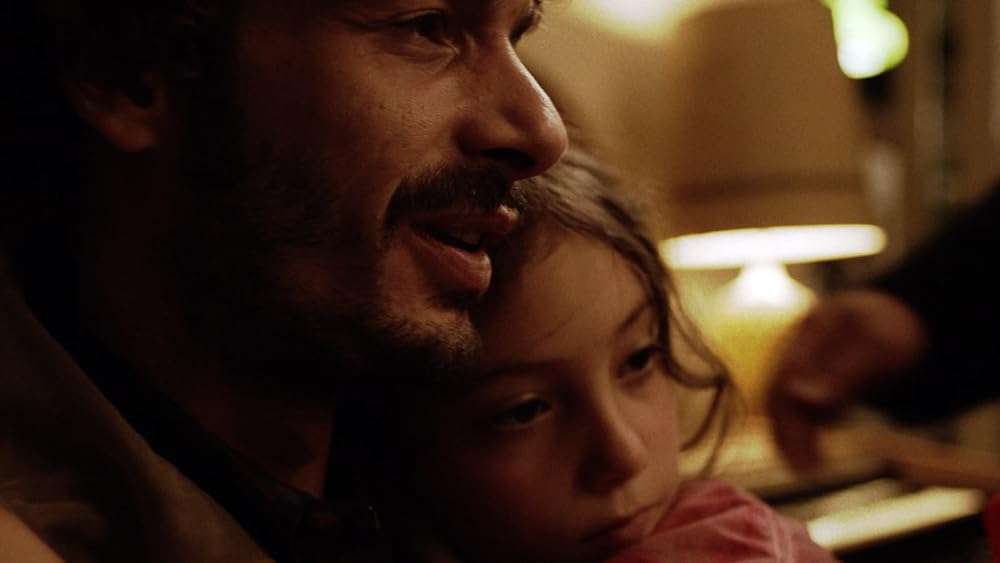Mexico’s Oscar entry for Best International Feature, “Tótem,” is utterly gripping on every level. Director Lila Avilés’ narrative command instantaneously draws you in via the intimate access it grants to the life of a seemingly ordinary Mexican family during a birthday celebration. Through carefully constructed, economic dialogue and an ensemble of superbly naturalistic performances, this delightfully tender yet powerfully emotive film touches on many complex ideas without ever breaking our immersion in the perspective of its seven-year-old protagonist, Sol (Naíma Sentíes).
The film begins with a touching moment of connection between Sol and Lucia (Iazau Larios) before launching us directly into and darting about a claustrophobic setting turbulently buzzing in preparation for a party. Sol is almost in the way during these moments, occupying spaces without fully being recognised. Hushed, coded conversations tip us off that something is slightly off about the whole affair.
Director Avilés’ fly-on-the-wall approach sparsely doles out exposition as it guides us in and out of the rooms and overhears exchanges of this vibrant, mournful setting. The storytelling technique not only emphasises the chaotic atmosphere of the household but also allows for the connections between its various members to be implied rather than outright stated. Clocking in at only 95 minutes, “Tótem” doesn’t waste a second developing these interpersonal relationships. Every scene deepens our understanding of this family’s dynamic even though much of Avilés’ impeccable characterisation is done through what isn’t stated; the lens that guides us through “Tótem’s” story is hyper-subjective.
Sol’s perspective is key, narratively and stylistically. Like her, we are forced to piece together information from eavesdropped words and contend with the slowburn revelation of this bittersweet celebration’s significance. She is a passive protagonist, but only because characters within the film soften the weight of the situation for her. The narrative construction leaves room for our own interpretations to come to the forefront and constantly leaves us grasping for the bigger picture in the periphery.

“Tótem” juxtaposes jubilant and somber tones exceptionally well, particularly toward the end, as each second gains greater and greater poignancy. These are, after all, the final impressions that will be left with Tonatiuh (Mateo Garía Elizondo), Sol’s father. Elizondo captures these contradictory feelings masterfully as the patriarch. The party becomes a vessel for celebrating the entire life of this man, not just this birthday. There is an innocent naivety to our young protagonist’s melancholy, not knowing but sensing that she has very little time left to cherish with her father. These intense, longing emotions slowly pave the way for elation, but never lose this sense of reflection.
The work of editor Oma Guzmán is highly commendable. Weaving such a vast yet intimate portrait of Sol’s family, the continuous shifting of focus develops this communal grief. The restraint in cutting to Tonatiuh allows everyone else’s feelings to be explored, reinforcing his absence and heightening the dramatic tension. Avilés’ careful, patient handling of the material prevents “Tótem” from ever becoming too messy. Despite being presented as a jumbled puzzle of sequences, the film never loses track of its throughline and always steers clear of maudlin melodrama. The naturalistic camerawork grounds the proceedings both literally and figuratively. Diego Tenorio’s cinematography not only relies on natural lighting but opts for low-angle shots and long takes to further place us in Sol’s perspective, a technique similar to the one used by Sean Baker in “The Florida Project.”
Lila Avilés finds a haunting beauty within “Tótem,” a film of reverent joy that is unlike anything else released in 2023. We float around and glide through this environment, silently observing a series of deeply private encounters and drawing conclusions about all the things left unsaid. The film culminates in a remarkable series of closing shots, as an expressive opera rendition from Sol transforms into a silent, static close-up that oozes with uncertain, complicated emotion. Naíma Sentíes guarded expressions paint a thousand words, isolated in the frame to almost symbolise an acceptance of her father’s mortality.
Bright flames, in turn, represent the light of her deep familial connection shining through the darkness of her current predicament. The image transitions to one of an empty bed. We are, however, not afforded the opportunity to linger on it. Instead, the credits roll as we sit and wait for a sense of resolution that will never and can never arrive – a closing note that mirrors the state of our forlorn focal point as she confronts the premature end of her relationship with Tonatiuh.
“Tótem” is one of the year’s finest pieces of filmmaking and a worthy contender for covetous international feature awards.



![The Other Side of the Wind [2018] Review- Everything In Its Right Place](http://www.highonfilms.com/wp-content/uploads/2019/01/1469816-4170896-zoomed2-768x432.jpg)

![Red Snow [2019] : ‘Japan Cuts’ Review – A Gloomy and Dark Tale of Lost Lives](http://www.highonfilms.com/wp-content/uploads/2019/08/White-Snake-1.jpg)


![I Was A Simple Man [2021] ‘LAAPFF’ Review: Hawaiian Ghost Tale is Layered and Meditative](http://www.highonfilms.com/wp-content/uploads/2021/09/I-Was-A-Simple-Man-1-768x432.jpg)